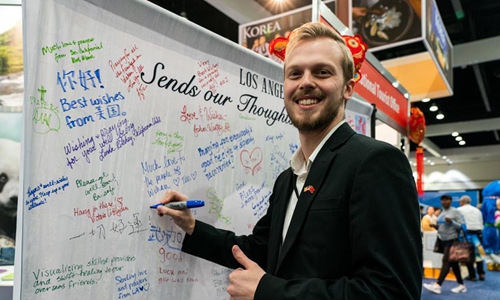Trump administration out of touch with generous spirit of the American public
By Zhang Yifei Source:Global Times Published: 2020/2/18 13:16:27

A visitor writes down words in support of China's fight against the novel coronavirus at the annual Los Angeles Travel & Adventure Show in Los Angeles, the United States, on Saturday. Photo: Xinhua
Since the end of 2019, several epidemics and disasters have occurred around the world. The novel coronavirus, which broke out in China has already had a global impact. Since the outbreak, China has received generous assistance from the international community, and has frequently interacted with governments in other countries and regions.
While governments in many countries offer friendship in line with the spirit of their society, US authorities seem to have diverged from the country's societal norms in their approach to battling the epidemic. While many US businesses, charities, medical community and non-government organizations are donating medical supplies to China and bolstering China's ability to fight the outbreak, the US government has been indifferent and appears to be lying in wait.
For example, on February 2 the US revised its Travel Advisory Level to alert Level 4 Do not travel to China. US Commerce Secretary Wilbur Ross said in late January the outbreak "will help to accelerate the return of jobs to North America."
These examples expose the deviation between US government and society, and the negative attitude and unwillingness of the Trump administration to get involved in international cooperation.
The US government's reluctance to cooperate reflects the Trump administration's strategy in dealing with the world and China on issues relating to international public health. Yet the proactive moves by US society indicate the weak foundation of some of the administration's strategies.
First, the global strategic contraction of the Trump administration, characterized by anti-globalization, has led to the absence of US guidance in the fights over international outbreak and disasters. Under the discourse of "America First," US interests have been prioritized over those of other countries, and any move which poses a potential threat to the US will be erased.
Along with withdrawing from the Paris Agreement, urging European allies to ratchet up their defense spending, and slapping tariffs on Chinese imports, the Trump administration's negative position toward humanitarian international cooperation in dealing with the outbreak is consistent with its foreign policy.
Second, the Trump administration may apply its strategic attitude toward China in its response to the coronavirus epidemic. The US government is not only absent from leading and organizing global forces to combat the virus, but it has on many occasions continued to regard China as its main strategic rival and carried out its strategy to contain China.
US Secretary of State Mike Pompeo said on January 30 that "the Chinese Communist Party presents the central threat of our times" during talks with British Foreign Secretary Dominic Raab about the so-called risks posed by Huawei, a Chinese high-tech giant. The US on February 10 charged four members of China's military with hacking into Equifax, one of US' largest credit bureaus, and stealing confidential trade files and personal data of around 145 million people in the US, which allegedly took place in 2017.
This rhetoric and these moves indicate US' determination to implement negative policies toward China. Such a stance will certainly be applied to international cooperation attempting to tackle the epidemic.
As a participant and beneficiary of globalization, US society cherishes hard-won China-US ties, and understands the shared destiny of humanity in the context of globalization. From the perspectives of both the sentiment of generosity and the pursuit of self-interest, US society is more aware of the challenges presented by the outbreak than its government. Only by transcending national boundaries and ideological prejudices can the international community, including China, overcome these tough challenges together.
The conservative foreign policy of the US means that Washington will not provide enough public goods to the international community facing global epidemics and disasters.
This will cause temporary shocks to international cooperation, while offering an opportunity for more countries to engage in global governance and establish a more reasonable international cooperation mechanism that rejects hegemony.
The author is an assistant research fellow with the Institute of American Studies of the Chinese Academy of Social Sciences. opinion@globaltimes.com.cn
Posted in: VIEWPOINT,CHINA-US,FEATURE